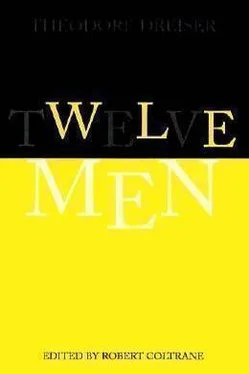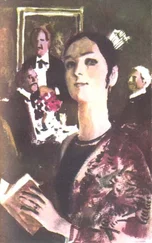Теодор Драйзер - Twelve Men
Здесь есть возможность читать онлайн «Теодор Драйзер - Twelve Men» весь текст электронной книги совершенно бесплатно (целиком полную версию без сокращений). В некоторых случаях можно слушать аудио, скачать через торрент в формате fb2 и присутствует краткое содержание. Год выпуска: 2014, Издательство: epubBooks Classics, Жанр: Биографии и Мемуары, на английском языке. Описание произведения, (предисловие) а так же отзывы посетителей доступны на портале библиотеки ЛибКат.
- Название:Twelve Men
- Автор:
- Издательство:epubBooks Classics
- Жанр:
- Год:2014
- ISBN:нет данных
- Рейтинг книги:4 / 5. Голосов: 1
-
Избранное:Добавить в избранное
- Отзывы:
-
Ваша оценка:
- 80
- 1
- 2
- 3
- 4
- 5
Twelve Men: краткое содержание, описание и аннотация
Предлагаем к чтению аннотацию, описание, краткое содержание или предисловие (зависит от того, что написал сам автор книги «Twelve Men»). Если вы не нашли необходимую информацию о книге — напишите в комментариях, мы постараемся отыскать её.
Twelve Men — читать онлайн бесплатно полную книгу (весь текст) целиком
Ниже представлен текст книги, разбитый по страницам. Система сохранения места последней прочитанной страницы, позволяет с удобством читать онлайн бесплатно книгу «Twelve Men», без необходимости каждый раз заново искать на чём Вы остановились. Поставьте закладку, и сможете в любой момент перейти на страницу, на которой закончили чтение.
Интервал:
Закладка:
"I'm naht drunk," returned the other. "Once an' fer all now, I'm askin' ye, arre ye goin' to give me that money?"
"No," replied Rourke, "I'm naht."
"Belave me," said the stranger, "I'll get it out av ye somehow," but for the moment he made no move, merely hanging about in an uncertain way. He seemed to have no definite plan for collecting the money, or if he had he had by now abandoned it.
Without paying any more attention to him, Rourke, still very irritated and defiant, returned to the fire. He tried to appear calm and indifferent, but the ex–workman, a non–union mason, I judged, followed after, standing before him and staring in the defiant, irritating way a drunken man will, not quite able to make up his mind what else to do. Presently Rourke, more to relieve the tedium of an embarrassing situation than anything else (a number of accusatory remarks having been passed), turned and began poking at the blaze, finally bending over to lay on a stick of wood. On the instant, and as if seized by sudden inspiration, whether because the tails of Rourke's long coat hung out in a most provoking fashion and suggested the thing that followed or not, I don't know, but now the red–faced intruder jumped forward, and seizing them in a most nimble and yet vigorous clutch, gave an amazing yank, which severed them straight up the back, from seat to nape, at the same time exclaiming:
"Ye'll naht pay me, will ye? Ye'll naht, will ye?"
On the instant a tremendous change came over the scene. It was as swift as stage play. Instantly Rourke was upright and faced about, shouting, "Now, be gob, ye've torn me coat, have ye! Now I'll tache ye! Now I'll show ye! Wait! Get ready, now. Now I'll fix ye, ye drunken, thavin' loafer," and at the same time he began to move upon the enemy in a kind of rhythmic, cryptic circle (some law governing anger and emotion, I presume), the while his hands opened and shut and his eyes looked as though they would be veiled completely by his narrowing lids. At the same time the stranger, apparently seeing his danger, began backing and circling in the same way around Rourke, as well as around the fire, until it looked as though they were performing a war dance. Round and round they went like two Hopi bucks or Zulu warriors, their faces displaying the most murderous cunning and intention to slay—only, instead of feathers and beads, they had on their negligible best. All the while Rourke was calling, "Come on, now! Get ready, now! I'll show ye, now! I'll fix ye, now! It's me coat ye'll rip, is it? Come on, now! Get ready! Make yerself ready! I'm goin' to give ye the lickin' av yer life! Come on, now! Come on, now! Come on, now!"
It was as though each had been secreted from the other and had to be sought out in some mysterious manner and in a circle. In spite of the feeling of distress that an impending struggle of this kind gives one, I could not help noting the comic condition of Rourke's back—the long coat beautifully ripped straight up the back, its ends fluttering in the wind like fans, and exposing his waistcoat and Sunday boiled white shirt—and laying up a laugh for the future. It was too ridiculous. The stranger had a most impressive and yet absurd air of drunken sternness written in his face, a do–or–die look.
Whether anything serious would really have happened I was never permitted to learn, for now, in addition to myself and the Italians, all of them excited and ready to defend their lord and master, some passengers from the nearby station and the street above as well as a foreman of a section gang helping at this same task, a great hulking brute of a man who looked quite able to handle both Rourke and his opponent at one and the same time, came forward and joined in this excited circle. Considerable effort was made on the part of the latter to learn just what the trouble was, after which the big foreman interposed with:
"What's the trouble here? Come, now! What's all this row, Rourke? Ye wouldn't fight here, would ye? Have him arristed, er go to his home—ye say ye know him—but don't be fightin' here. Supposin' waan av the bosses should be comin' along now?" and at the same time he interposed his great bulk between the two.
Rourke, quieted some by this interruption but still sputtering with rage and disgrace, shouted, "Lookit me coat! Lookit what he done to me coat! See what he done to me coat! Man alive, d'ye think I'm goin' to stand fer the likes av that? It's naht me that can be waalked on by a loafer like that—an' me payin' him more than ever he was worth, an' him waalkin' aaf an' l'avin' the job half done. I'll fix him this time. I'll show him. I'll tache him to be comin' around an' disturbin' a man when he's at his work. I'll fix him now," and once more he began to move. But the great foreman was not so easily to be disposed of.
"Well then, let's caall the police," he argued in a highly conciliatory mood. "Ye can't be fightin' him here. Sure, ye don't waant to do that. What'll the chafe think? What is it ye'll think av yerself?"
At the same time he turned to find the intruder and demand to know what he meant by it, but the latter had already decamped. Seeing the crowd that had and was gathering, and that he was likely to encounter more forms of trouble than he had anticipated, he had started down the track toward Mott Haven.
"I'll fix ye!" Rourke shouted when he saw him going. "Ye'll pay fer this. I'll have ye arristed. Wait! Ye'll naht get aaf so aisy this time."
But just the same the storm was over for the present, anyhow, the man gone, and in a little while Rourke left for his home at Mount Vernon to repair his tattered condition. I never saw a man so crestfallen, nor one more determined to "have the laa on him" in my life. Afterwards, when I inquired very cautiously what he had done about it—this was a week or two later—he replied, "Shewer, what can ye do with a loafer like that? He has no money, an' lockin' him up won't help his wife an' children any."
Thus ended a perfect scene out of Kilkenny.
It was not so very long after I arrived that Rourke began to tell me of a building which the company was going to erect in Mott Haven Yard, one of its great switching centers. It was to be an important affair, according to him, sixty by two hundred feet in breadth and length, of brick and stone, and was to be built under a time limit of three months, an arrangement by which the company hoped to find out how satisfactorily it could do work for itself rather than by outside contract, which it was always hoping to avoid. From his manner and conversation, I judged that Rourke was eager to get this job, for he had been a contractor of some ability in his day before he ever went to work for the company, and felt, I am sure, that fate had done him an injustice in not allowing him to remain one. In addition, he felt a little above the odds and ends of masonry that he was now called on to do, where formerly he had done so much more important work. He was eager to be a real foreman once more, a big one, and to show the company that he could erect this building and thus make a little place for himself in the latter's good graces, although to what end I could not quite make out. He would never have made a suitable general foreman. At the same time, he was a little afraid of the clerical details, those terrible nightmares of reports, o.k.s and the like.
"How arre ye feelin', Teddy, b'y?" he often inquired of me during this period, with a greater show of interest in my troublesome health than ever before. I talked of leaving, I suppose, from time to time because sheer financial necessity was about to compel it.
"Fine, Rourke," I would say, "never better. I'm feeling better every day."
"That's good. Ye're the right man in the right place now. If ye was to sthay a year er two at this work it would be the makin' av ye. Ye're too thin. Ye need more chist," and he would tap my bony chest in a kindly manner. "I niver have a sick day, meself."
Читать дальшеИнтервал:
Закладка:
Похожие книги на «Twelve Men»
Представляем Вашему вниманию похожие книги на «Twelve Men» списком для выбора. Мы отобрали схожую по названию и смыслу литературу в надежде предоставить читателям больше вариантов отыскать новые, интересные, ещё непрочитанные произведения.
Обсуждение, отзывы о книге «Twelve Men» и просто собственные мнения читателей. Оставьте ваши комментарии, напишите, что Вы думаете о произведении, его смысле или главных героях. Укажите что конкретно понравилось, а что нет, и почему Вы так считаете.









